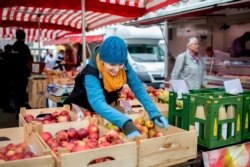Picture a traditional English summer. For many, Wimbledon and strawberries come to mind.
Since 1877, the lawn tennis tournament at Wimbledon, a suburb of London, has been a fixture in Britain’s social calendar and one of the world’s great sporting events.
Tennis fans and celebrities, as well as the country’s royals, throng the stands in June and July and invariably devour the juicy strawberries as they watch the action unfold.
Not this year.
Because of the coronavirus, Wimbledon has been canceled. But it is not only tennis that Britain will miss. Strawberries, too, are likely to be scarce, as well as other fresh produce.
Europe’s fruit and vegetable farmers are warning that the continent’s fresh food supplies will be increasingly squeezed, as COVID-19 lockdowns and border closures prolong, hampering their ability to secure the seasonal skilled labor they rely on to harvest crops.
The cross-border transport of produce is also likely to compound supply problems, they say.
The problem is already being felt. Spain’s southern region of Andalusia supplies the rest of Europe with 90% of the early seasonal fruit at this time of the year. The strawberry harvest has already been disrupted.
“We have been losing money for five days now,” Sergio Gomez, a strawberry farmer, told the Agence France-Presse news agency.
Like most of Europe, Spain, a coronavirus hot spot, has been under a lockdown since mid-March in a bid to curb the spread of the virus.
As farmers gear up for the first wave of seasonal crops, governments are exploring how to ease labor shortages, including the introduction of "green lanes" to allow fresh produce to be transported quickly across European Union borders and the relaxing of travel restrictions for temporary migrant farmhands.
In Britain, farmers are trying to figure out how they will make up a shortfall of pickers and are looking to recruit as many as 90,000 people to fill the gaps left by experienced overseas workers, mainly from the central European countries of Poland, Romania and Bulgaria.
They warn that if they cannot make up labor shortfalls, a third of the summer's food harvest could go to waste.
Environment Minister George Eustice is trying to invoke the spirt of World War II, when the Women's Land Army, a civilian organization created during the conflict, helped to replace farmhands fighting overseas.
He is encouraging people who have lost jobs, as well as students, to join a new Land Army.
“We need to mobilize the British work force to fill that gap and make sure our excellent fruit and vegetables are on people’s plates over the summer months,” Eustice said.
More than 10,000 people have signed up for a campaign known as Feed the Nation.
Concordia, a farm labor charity that helps to recruit seasonal laborers for British farms, is in discussions with British and Romanian governments about organizing charter flights to bring in seasonal workers. Concordia Chief Executive Stephanie Maurel told Sky News she is “desperately worried” about the labor shortage impact on Britain’s harvest.
The central European states of the Czech Republic, Hungary and Austria have imposed land border closures, blocking migrant workers from crossing the continent. France has called on domestic workers who have been laid off to help farmers pick fruit and vegetables.
Agriculture Minister Didier Guillaume says he hopes a shadow army is waiting to join forces.
“I tell them — join the great army of French agriculture. Join those who will allow us to eat in a clean, healthy and sustainable way,” Guillaume said.
Christine Lambert, head of France’s national union of farmers, said, “Due to the closure of the Schengen borders, but also to movement restrictions in Europe, the Poles and Romanians who used to come, won’t anymore. If our call is not heard, the production will remain in the fields and the entire fruit and vegetable sector will be damaged.”
Lambert estimates around 200,000 workers are needed in the next three months to pick strawberries and other seasonal crops.
The labor shortage will only worsen as the harvesting season unfolds. Around 800,000 seasonal workers come from overseas, mainly central and eastern Europe, Tunisia and Morocco for the entire harvest season.
Germany is also facing disrupted harvests and fears crops will rot in the fields. The country will need to find 300,000 seasonal workers. Last month, just as the border closures started, asparagus farmers from Brandenburg chartered a flight to fly in 190 Romanians. That number is a fraction of the 5,000 workers Brandenburg farmers need.
Even when easier ways are being found to get experienced pickers into Germany, farmers and recruiters are finding central European pickers are reluctant to travel, for fear of contracting the coronavirus or of being quarantined on their return home.
Across Europe, officials and farmers hope university students and furloughed workers will sign up to support their local farms.
In Britain, to encourage furloughed workers who are receiving 80% of their salaries from government support schemes, rules have been relaxed to allow them to claim the government benefit and earn extra money from harvesting.
Some farmers say unskilled labor will undoubtedly help, but they caution that untried farmhands take much longer to do the work and can often damage crops and produce.
Nonetheless, National Farming Union Vice President Tom Bradshaw said inexperienced farmhands are needed.
“There will be thousands of vacancies opening up in fields, polytunnels, glasshouses and packhouses across the country in the coming weeks, and we need people to help deliver healthy, affordable British fruit and veg from field to plate,” he said.











